
 |
 |
 |
 |
Safeguarding the Socioeconomic Benefits of Sustainable Forest Management
and Other Climate Finance
Presented by the Centre for International Sustainable Development Law (CISDL)
and the Environmental Quality Protection Foundation (EQPF)
|
|
 |
 |
 |
 |
Heike Schroeder, University of East Anglia, UK, moderated the session, noting forests cover about 30% of earth’s land surface, and provide many ecosystem services, notably storing carbon. She introduced Ying-Shih Hsieh, EQPF, stating that EQPF is a co-host of the event.
Zakir Hossain Khan, Transparency International, Bangladesh, shared experiences from Bangladesh on the use of climate finances. He highlighted the Bangladesh Climate Change Trust Fund, which is fully funded by the government, and the Bangladesh Climate Change Resilience Fund, through which international climate change financing is channeled. He emphasized: lack of coordination; inadequate disclosure of funding channels to communities; and poor information to the communities about funding approval.
Katherine Lofts, CISDL, discussed the intersection of human rights and REDD+, underscoring the need to safeguard the potential benefits REDD+ could deliver. To address the risks posed by the development of REDD+ in countries with fragile institutions, governance challenges and historical power imbalances, she outlined the steps needed to implement a rights-based approach to REDD+ development.
Chiung Lien Liu, Forestry Bureau, Council of Agriculture, Taiwan, explained that the island is rich in biodiversity and remains 60% forested. She stressed logging was banned in the 1990s, and said they currently practice forest management and conservation and focus on communication and participation, including with indigenous communities. She identified ongoing challenges, notably the pressure of urban development and high population density.
Michael Bucki, Directorate-General Climate (DG-Climate), European Commission, spoke on Forest Law Enforcement, Governance and Trade (FLEGT) and REDD+, saying FLEGT is a bilateral agreement between the EU and partners to strengthen dialogue and national laws on forestry and timber. He highlighted the challenges faced by both FLEGT and REDD+ including: unclear legal frameworks on tenure; poor state of information systems; risk of corruption and ineffective legal systems; and potential risks and benefits for local communities.
Carlos Rene Romero, Ministry of Forest Development and Cooperation, Honduras, spoke on his country’s work on forestry, protected areas and wildlife protection, outlining its diversity, land tenure, institutions and management strategies. He noted that while his country has 59% forest cover, it faces challenges from land use change, forest fires and illegal logging. He said Honduras is involved in both FLEGT and REDD+, and added this would demonstrate the initiatives can work together.
Li-Wei Huang, EQPF, highlighted EQPF’s efforts to protect indigenous rights in Taiwan’s afforestation efforts. She stressed the need to incorporate livelihood benefits in afforestation efforts, identifying “innovative cooperation” on this between EQPF, the Taiwan Forest Bureau and the Red Cross Society.
During discussions, participants considered: the problems presented by leakage; forest governance policies that prioritize fee-collection, not conservation; government coordination of forestry policy; formalization of local community actions to enhance landslide prevention in mountain areas; “tree calculators” to evaluate the importance and function forests; and emissions from extractive industries. |
 |
 |
 |
 |
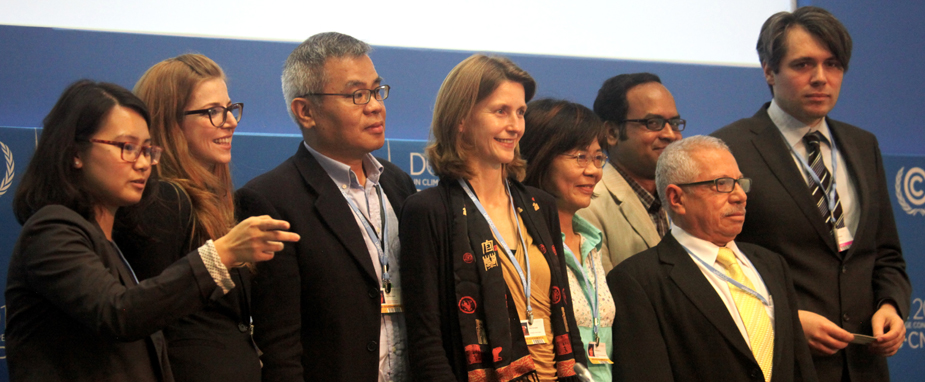 |
Panel (L-R): Li-Wei Huang, EQFP; Katherine Lofts, CISDL; Ying-Shih Hseih, EQPF; Moderator Heike Schroeder, University of East Anglia, UK; Chiung-Lein Liu, Forestry Bureau, Taiwan; Carlos Rene Romero, Ministry of Forestry Development and Cooperation, Honduras; Zakir Hossain Khan, Transparency International; and Michael Bucki, DG-Climate, European Commission.
|
|
 |
 |
 |
 |
Moderated by Marja-Liisa Tapio-Biström, UN Food and Agriculture Organization (FAO), this event featured opening remarks by Sergio Zelaya, UNCCD Secretariat, a keynote address by Alexandre Meybeck, FAO, and a panel discussion on the importance of climate-smart agriculture methods and ways to scale it up.
Zelaya outlined the importance of climate-smart agriculture to sustainable land management in drylands. Speaking on the UNCCD’s engagement in the climate-smart agriculture dialogue, he highlighted the sustainable development goal of a land degradation-neutral world, as well as concerns with shrinking farmlands due to urbanization and climate change.
Describing the strain placed on farmers to address food security and adaptation as well as to contribute to mitigation, Meybeck stressed the need to support farmers by providing them with the tools to best address these issues, noting climate-smart agriculture is one good solution. He highlighted climate-smart agriculture is an integrated approach to food security, and called for policies, programmes and finance to operationalize it in the most vulnerable agricultural drylands. Emphasizing that indigenous peoples living in drylands have historically used local knowledge to address scarcity, he underscored the need for a systems approach to climate-smart agriculture incorporating ecosystems and people.
In the panel discussion, Keith Alverson, UN Environment Programme (UNEP), explained UNEP’s interest in ecosystem services related to agriculture and food security, and noted that an emerging area requiring UNEP policy guidance is ecosystem services of smallholder-farmer-dominated agricultural lands in Africa. He stressed that the food security challenge should not only be addressed by agriculture but also through markets, development of infrastructure and the maintenance of healthy ecosystems.
Sakhile Koketso, Convention on Biological Diversity (CBD) Secretariat, spoke on the contribution of agricultural biodiversity to climate-smart agriculture, stressing the need to conserve genetic biodiversity, particularly species that are wild relatives of food crops. She highlighted drivers of agricultural biodiversity loss, including commercialization of agriculture, land degradation and large-scale production.
Koko Warner, UN University Institute for Environment and Human Security (UNU-EHS), described a study on households with rainfall-dependent livelihoods, which found that for more vulnerable households, changing weather patterns caused an increase in unsustainable migration. She called for further research to explore more sustainable, diverse livelihoods for people dependent on weather patterns.
During discussions, participants considered: limits to adaptation in areas already experiencing an increase in temperature; concerns of smallholder farmers that climate-smart agriculture is a tool to protect large-scale farmers; and the need to address increasing urban populations due to climate-related migration. Others discussed: how to address smallholder farmers’ desire to shift from traditional to modern agricultural practices; whether increasing income was an indicator of the success of resilient systems; and the need to prepare for a range of conditions due to climate change.
|
 |
 |
 |
 |
After Doha: Balancing Adaptation, Mitigation and Economic Development
Presented by Qatar and the Harvard Project on Climate Agreements (HPCA)
|
|
 |
 |
 |
 |
This session was moderated by Robert Stavins, Harvard Kennedy School of Government, US, who highlighted four lessons from the HPCA: market-based approaches are probably essential; getting carbon prices right is necessary, but not sufficient, because the public-good nature of research and development (R&D) means that the private sector will under-invest; developing country participation is essential, and a central task of international negotiations is bringing key countries on board to fulfill the Ad Hoc Working Group on the Durban Platform for Enhanced Action (ADP) while remaining faithful to the principle of common but differentiated responsibilities and respective capacities; and a de facto policy architecture may already be emerging through actions such as the linkage of national and regional cap-and-trade systems.
Rabi Mohtar, Executive Director, Qatar Environment and Energy Research Institute (QEERI), said the focus of Qatar’s climate change research is on the regional scale and noted a specific project on the development and application of a regional model for simulating dust storms. He called for local-scale research in this area, stressing needs including: climate models for arid regions; trends in observed climate signals; assessments of future changes in rainfall patterns and impacts on water security; and dust and sandstorm modeling.
Carlo Carraro, University of Venice, Italy, said policy options to achieve the 2°C target include: reducing emissions quickly and cooperatively; delaying emissions reductions and reducing emission stocks later, requiring negative emissions technologies in the future; adaptation; and investment in R&D. He said mitigation is hard to achieve because: it requires large participation to be effective; it has externalities with a strong incentive to free ride; it has uncertain future benefits versus more certain present costs; it has to work against technological lock-ins and path dependency; and CO2 removal technologies are unlikely to deliver the necessary size of reductions from negative emissions technologies. Adaptation, he stressed, is likely to be necessary regardless of the mitigation policy undertaken and added that markets can partly drive adaptation, but government involvement is required. He emphasized that mitigation and adaptation are interlinked, saying joint implementation is more efficient than only mitigation or adaptation.
Fahad Bin Mohammed Al-Attiya, Chairman, Qatar National Food Security Programme, noted scenario-building exercises have guided development of projects to improve water security. He said in the absence of water resources, the Gulf has adapted to enable economic development, but questioned whether their water supply is entirely secure. He noted Qatar aims to transition to solar desalination within the next ten years, saying the technology developed to allow this switch will be available to other developing countries facing similar challenges.
During discussions, participants considered: costs and benefits of geo-engineering; Qatar’s mitigation plans; solar desalination; and market-based approaches versus other paradigms, such as common pool resources. |
 |
 |
 |
 |
Carbon Management in GCC Countries
Presented by the Gulf Cooperation Council (GCC) |
|
 |
 |
 |
 |
Moderator Taha Zatari, Designated National Authority of the Clean Development Mechanism (CDM-DNA), Saudi Arabia, introduced the panel on carbon management in GCC countries, noting it would address: how these countries manage emissions; project administration; carbon capture, utilization and storage (CCUS); renewable energy plans; and new market mechanisms.
Ali Al-Meshari, Saudi Aramco, described Saudi Arabia’s work on climate change mitigation and Saudi Aramco’s efforts in carbon management, with a focus on its Carbon Management Roadmap. Noting Saudi Aramco’s work on energy management, flare reduction and carbon management, he detailed the five parts of the Roadmap, involving: capture of CO2 from fixed sources; reduction of CO2 from mobile sources; industrial applications of captured CO2; CO2 storage; and CO2-enhanced oil recovery (EOR).
Ahmed Al-Eidan, Saudi Aramco, Saudi Arabia, presented an overview of Saudi Aramco’s demonstration project on CO2-EOR, stressing that since Saudi Arabia will not need EOR for decades to come, given its oil reserves, the focus of the project is environmental. He explained the demonstration was aimed at using a proven technology to develop a CCUS project, noting this required man-made sources for CO2 injection, and monitoring and surveillance, including in post-closure phases. He provided technical details on the demonstration project and monitoring activities.
Abdulmalek Alobra, CDM-DNA, Saudi Arabia, discussed Saudi Arabia’s CDM-DNA, offering an overview of the DNA, its achievements, CDM projects in the pipeline and future tasks and plans. Among its achievements, he highlighted public awareness activities on the carbon market mechanism, including workshops, field trips and the development of a website. Listing projects in the CDM pipeline, he noted they include gas emissions reductions, solar power and energy efficiency.
In discussions, participants and panelists further considered, among other things: cooperation projects on industrial applications of CO2; the difference between commercial applications of EOR and the CO2-EOR demonstration project; renewable projects in the CDM pipeline; and the benefits that could be achieved if EOR were included under the CDM.
|
Moderator Gino van Begin, Secretary General, ICLEI, said this event would showcase efforts to address mitigation and adaptation at the subnational level, and to influence the negotiation process to better support local government action.
Evelyne Huytebroek, Minister of Environment, Brussels Capital Region, Belgium, emphasized parties that are frontrunners on climate action have also effectively engaged their local governments. She said she would deliver a statement during the COP 18 High Level Segment on behalf of local and subnational governments to encourage parties to raise their ambitions by working closer with subnational governments.
Reta Jo Lewis, Department of State, US, highlighted current efforts by US cities and states. She recognized US Secretary of State Hillary Clinton’s efforts to connect local representatives to their international counterparts, noting that diplomacy goes beyond nation-to-nation, extending to state and local leaders.
Robert Kehew, UN-Habitat, noted urban contributions to greenhouse gas (GHG) emissions and urban population growth. He stated that decisions made by cities now will influence GHG emissions for decades to come, inter alia: whether cities are compact or sprawling; what transport strategies are chosen; and how energy grids are developed. He highlighted a partnership promoting low-emission urban development strategies (Urban LEDS) in emerging economies between ICLEI and UN-Habitat. Jens Fugl, European Commission, stressed support for this partnership.
Yunus Arikan, ICLEI, highlighted efforts to raise attention to local climate actions, including: the Durban Adaptation Charter 2011; the Rio+20 Global Town Hall; and the World Mayors Council on Climate Change. He also explained the Carbonn Cities Climate Registry and emphasized the need to scale-up reporting efforts and work with civil society, noting collaboration with the WWF Earth Hour City Challenge.
Rodrigo Perpétuo, Belo Horizonte City Hall, Brazil, noted his city’s efforts to address climate change, but also highlighted challenges including: poverty; energy access; solid waste; and urban mobility. He highlighted the city’s efforts, including: biogas capture from methane gas; transport planning, including bikes and bus rapid transport; renewable energy implementation; and educational programmes.
Yuko Nishida, Tokyo Metro Government, Japan, identified two efforts, the Tokyo Cap-and-Trade programme and a focus on International Knowledge Exchange. She stated this is the world’s first urban cap-and-trade programme.
Nancy Lago, City of Buenos Aires, Argentina, noted the impacts of climate change in her city, including temperature increases and urban flooding. She outlined mitigation efforts in the energy and transport sectors, and adaptation strategies, including a hydrologic plan to address flooding.
Sunil Pote, Thane Municipal Corporation, India, stressed the need for technological interventions and existing efforts in Thane to address renewable energy and energy efficiency since 2000, including the Solar City Master Plan.
Rodolfo Godinez, Ministry of Foreign Affairs, Mexico, stated Mexico’s cities will help Mexico reach its climate targets. Edgar Villasenor, ICLEI Mexico, explained the Municipal Climate Action Planning strategy (PACMUN), which involves over 200 municipalities and receives funding from different sources. He stressed municipalities should also be included in the national law on climate change.
Chang Huey-Por, Kaohsiung City, Taiwan, introduced his city, identifying its industrial activities, but also its ambition to be a green city. He noted the role played by Mayor Chen Chu, who has set strict goals and a vision for the city.
During discussion, participants asked about the involvement of small and medium-sized cities, target-setting and integrated assessment tools, and about how to better link local climate actions and national positions, which often occur “behind closed doors.”
|
 |
 |
 |
 |
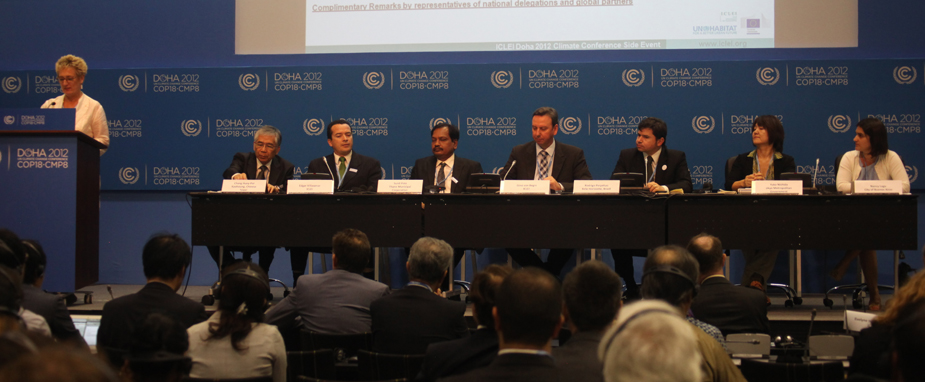 |
Panel (L-R): Evelyne Huytebroek, Minister of Environment, Brussels Capital Region, Belgium; Chang Huey-Por, Kaohsiung City, Taiwan; Edgar Villasenor, ICLEI; Sunil Pote, Thane Municipal Corporation, India; Gino van Begin, Secretary General, ICLEI; Rodrigo Perpétuo, Belo Horizonte, Brazil; Yuko Nishida, Tokyo Metropolitan Government, Japan; and Nancy Lago, City of Buenos Aires, Argentina.
|
|
 |
 |
 |
 |
 |
 |
 |
 |
Green Transformation and Livable Cities
Presented by the UN Development Programme (UNDP), Institute for Urban and Environmental Studies of the Chinese Academy of Social Sciences (IUE-CASS), and State Counsellors Office (SCCO), China
|
|
 |
 |
 |
 |
|
 |
 |
 |
 |
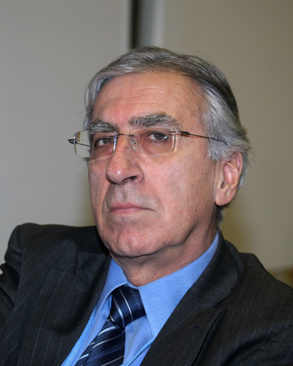 |
| Luis Gomez-Echeverri, SE4ALL, presented a road map to sustainable, livable cities, stressing the key was efficient and effective governance. |
|
 |
 |
 |
 |
|
|
This session, moderated by Pan Jiahua, General Director, IUE-CASS, focused on economic and urban transformations in China, outlining China’s steps towards a low-carbon, green economy and sustainable, livable cities.
Lin Yanhua, Counselor, SCCO, China, addressed the “green, low-carbon and circular” new economy in China, providing an overview of international climate change negotiations and describing climate change as the driver of an energy revolution. He underscored that China has entered a “critical period” of both transition and opportunity, saying that new economic and market systems are emerging, and the direction of change is towards a green, low-carbon economy.
Wei Houkai, Deputy-Director, IUE-CASS, pointed to six types of development needed for building sustainable and livable cities in China: intensive; innovative; integrated; harmonious; green; and characteristic. Noting urbanization in China had reached 51%, he pointed to the major challenges of rapid urbanization, including the high cost of extending urban services to incoming urban migrants and the governance of large cities.
Wu Zongxin, Tsinghua University and State Council, China, discussed China’s transition to a green and low-carbon energy future, highlighting the country’s challenges with increasing energy consumption, improving energy efficiency and addressing oil dependence and emissions. He outlined transition paths to achieve green, low-carbon energy, and initiatives in China such as reducing the CO2 emission intensity of gross domestic product and developing non-fossil fuel energy sources. He also presented strategies for energy-efficient urban growth, including restraining the geographic expansion of cities and increasing urban population density. He underscored China will continue to focus on energy savings and low-carbon energy to address climate change challenges and energy security.
Luis Gomez-Echeverri, Sustainable Energy for All (SE4ALL), discussed the challenges and opportunities of Chinese urbanization. Underscoring comments of previous panelists on the scale of urban growth in China, he pointed to joint work by CASS and UNDP on cities and urbanization, noting their focus in a forthcoming report on human development and quality of life. He underscored trends and challenges that would be addressed by the report, including urban demographic trends.
Speaking on how to address traffic challenges in rapidly urbanizing areas, Zhang Yantong, SCCO, informed participants of the outcomes of the 18th Conference of the Chinese Communist Party Congress (CCPC), notably its adoption of a general policy of Ecological Civilization. He said this placed ecological goals at the same level of priority as existing policies on economic, political, cultural and social development. He added that Ecological Civilization would be fully implemented in all aspects of economic development.
Renata Lok Dessallien, UNDP China, highlighted that China is at an “historic crossroad” in its development trajectory, and lauded its “visionary leadership” in adopting Ecological Civilization and aiming for a green transformation.
|
 |
 |
 |
 |
Low-Carbon Climate Resilient Development: The Kenyan Experience
Presented by the International Institute for Sustainable Development (IISD) and Kenya
|
|
 |
 |
 |
 |
|
 |
 |
 |
 |
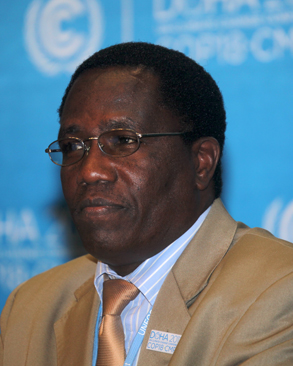 |
| Stephen King’uyu, Ministry of Environment and Mineral Resources, Kenya, presented the KCCAP, noting participation among different ministries and stakeholder groups, including the “mwananchi” (the local person on the ground). |
|
 |
 |
 |
 |
|
|
Geoffrey Wahungu, National Environment Management Authority, Kenya, moderated the session on the Kenya National Climate Change Action Plan (KCCAP), and Charles Mutai, Ministry of Environment and Mineral Resources, Kenya, gave a note of thanks.
Lawrence Mwadime, Ministry of Forestry and Wildlife, Kenya, introduced the KCCAP to address low-carbon climate resilient development. He stated the forestry sector was identified as important to addressing adaptation, mitigation and sustainable development, including through reforestation efforts in water catchment areas.
Richard Gledhill, Climate and Development Knowledge Network (CDKN), lauded the KCCAP. He said that the plan was developed through an inter-ministerial, multisectoral approach, and noted the engagement of civil society and the private sector. He said that Kenya was a “role model” for other African states, and stressed CDKN’s commitment to disseminating lessons learned to other developing countries.
Christoffer Bertelsen, Ministry of Foreign Affairs, Denmark, commended Kenya on the development of their KCCAP, and highlighted that this plan showcases the benefits of low-emission development. He said implementation of the plan will create green jobs, reduce import dependency and promote growth in new sectors.
Stephen King’uyu, Ministry of Environment and Mineral Resources, Kenya, presented an overview of the KCCAP. He highlighted KCCAP’s sub-themes, including: a low-carbon climate resilient development pathway; an enabling policy and regulatory framework; adaptation; mitigation; a technology action plan; performance and benefits measurements; knowledge management and capacity development; finance; and coordination and management.
Pius Kollikho, KenGen, Kenya, presented an energy perspective on the plan. He highlighted Kenya’s dependence on large hydropower, which renders the country vulnerable to changes in rainfall patterns. He explained the country is now scaling up geothermal, wind, and solar power generation, and hopes to increase energy production to 50,000 Gw hours by 2030. He emphasized, inter alia, that everyone has a role to play in attaining low-carbon, climate resilient development and holding institutions accountable to their commitments on energy efficiency targets.
Esther Magambo, Ministry of Agriculture, Kenya, stressed the importance of the agricultural sector in the KCCAP, noting livestock emissions alone equated roughly 30% of total emissions in 2010. While adaptation is their first priority, she stated climate-smart agriculture efforts also have mitigation benefits.
Laura Würtenberger, Environmental Change Network (ECN), explained that in a business as usual scenario, Kenya is projected to produce 100 Mt of CO2 equivalent by 2030. In terms of highest impact mitigation activities, she listed, inter alia: restoration of forests on degraded land; the scaling up of geothermal energy; reforestation on degraded lands; and deploying improved cook stoves.
Deborah Murphy, IISD, noted IISD’s work with a sub-component of the KCCAP, specifically on low-carbon climate resilient development. She stated this sub-component has three parts, in the following order: sustainable development to meet the goals of Kenya’s Vision 2030; adaptation to reduce vulnerability; and mitigation, noting emissions should be managed where possible.
During discussions, participants considered: safeguards for indigenous communities as the country transitions to low-carbon, climate resilient development; the emissions attributed to pastoralist livelihoods; the viability of a low-carbon economy; the baseline for emissions due to livestock, relative to other major global emitters; and the need to incorporate rural electrification.
|
 |
 |
 |
 |
The Water-Energy-Food-Climate Nexus in the GCC
Presented by the United Arab Emirates and New York University
|
|
 |
 |
 |
 |
|
 |
 |
 |
 |
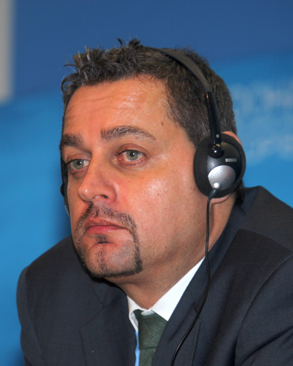 |
| Dominic Kailashnath Waughray, WEF, emphasized the impact of lifestyle patterns, in particular the increasing consumption of meat, on water consumption, noting “a wealthy world is a highly-consuming world.” |
|
 |
 |
 |
 |
|
|
This session, moderated by Bernice Lee, Chatham House, considered the intersections of water, energy, food and climate, with a focus on the impacts of this nexus in the GCC region. Lee called the concept of the nexus “powerful,” noting the challenges of addressing the interconnectedness and boundaries of these resources.
Thani Al Zeyoudi, Ministry of Foreign Affairs, United Arab Emirates, pointed to water scarcity as one of the “greatest tests” for sustainable development, and outlined activities in his country to address these challenges, including water-saving building codes, renewable energy targets and water efficiency measures in agriculture. He highlighted an International Water Summit to be held in parallel with the World Future Energy Summit in Abu Dhabi in January 2013.
Abdu Gasem Alassiri, FAO, presented a paper on Saudi Arabia’s response to climate change, highlighting that arid and semi-arid areas comprise more than 85% of its land area. He outlined climate impacts and projections, and added that other pressures such as changing land-use pressures, agriculture, livestock husbandry and deforestation also contribute to environmental change.
Mohammed Al Madfai, Environment Agency Abu Dhabi, United Arab Emirates, said the United Arab Emirates has developed a Vision 20/30, of which water is one priority area. He identified groundwater as one of the main sources of water in the United Arab Emirates, saying land use has negatively affected aquifers.
Pervaiz Amir, Global Water Partnership (GWP), called for being “very choosy” about the application of agriculture in the GCC region, due to the comparative advantage held by other regions. He called for a science-based response through investment in research and human resource training.
Rabi Mohtar, Executive Director, QEERI, emphasized the vulnerability of the region to food and water insecurity. He highlighted: governance, stressing the need to bring all stakeholders to the table; technology, urging integrative and regionally-appropriate technologies; civil society, commenting on the need for education; and the private sector, calling business essential for financing R&D and mobilizing technology.
Helen Mountford, Organisation for Economic Co-operation and Development (OECD), discussed a “portfolio” of policy tools for addressing water and energy demand, with a focus on price tools. She underscored that general and existing subsidies tend to be inefficient tools for assisting the poor, and urged for pricing reforms in the water and energy sectors.
Dominic Kailashnath Waughray, World Economic Forum (WEF), noted the need to reframe the water challenge into terms understood by the private sector, in particular defining the “choke points” at which water issues begin to inhibit desired economic growth. He called for considering the need to make energy production both carbon- and water-neutral.
During discussions, participants considered the need for: encouraging institutions to talk “across silos”; identifying how to build resilience into the international system; rethinking what is meant by development; embedding the nexus into post-2015 sustainable development goals; and identifying what has worked, how and why.
Panelists further identified key elements needed as: multidimensional partnerships to mobilize development; reduction of food waste; examination of water and food subsidies; careful examination of feedback loops within the water-food-energy nexus; wise management of water consumption; livelihoods protection; and the use of virtual water.
|
 |
The Earth Negotiations Bulletin on the side (ENBOTS) © <enb@iisd.org> is a special publication of the International Institute for Sustainable Development (IISD) in cooperation with the State of Qatar. This issue has been written by Jennifer Lenhart, Tallash Kantai, Kate Neville and Anna Schulz. The Digital Editor is Kate Harris. The Editor is Liz Willetts <liz@iisd.org>. The Director of IISD Reporting Services is Langston James “Kimo” Goree VI <kimo@iisd.org>. Support for the publication of ENBOTS at the Doha Climate Change Conference - November 2012 has been provided by the State of Qatar. The opinions expressed in ENBOTS are those of the authors and do not necessarily reflect the views of IISD and funders. Excerpts from ENBOTS may be used in non-commercial publications only with appropriate academic citation. For permission to use this material in commercial publications, contact the Director of IISD Reporting Services at <kimo@iisd.org>. Electronic versions of issues of ENBOTS from the Doha Climate Change Conference - November 2012 can be found on the Linkages website at http://enb.iisd.org/climate/cop18/enbots/. The ENBOTS Team at the Doha Climate Change Conference - November 2012 can be contacted by e-mail at <anna@iisd.org>.
|
|
|
|